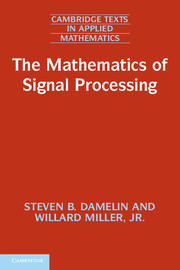Book contents
- Frontmatter
- Contents
- Preface
- Introduction
- 1 Normed vector spaces
- 2 Analytic tools
- 3 Fourier series
- 4 The Fourier transform
- 5 Compressive sampling
- 6 Discrete transforms
- 7 Linear filters
- 8 Windowed Fourier and continuous wavelet transforms. Frames
- 9 Multiresolution analysis
- 10 Discrete wavelet theory
- 11 Biorthogonal filters and wavelets
- 12 Parsimonious representation of data
- References
- Index
10 - Discrete wavelet theory
Published online by Cambridge University Press: 05 June 2012
- Frontmatter
- Contents
- Preface
- Introduction
- 1 Normed vector spaces
- 2 Analytic tools
- 3 Fourier series
- 4 The Fourier transform
- 5 Compressive sampling
- 6 Discrete transforms
- 7 Linear filters
- 8 Windowed Fourier and continuous wavelet transforms. Frames
- 9 Multiresolution analysis
- 10 Discrete wavelet theory
- 11 Biorthogonal filters and wavelets
- 12 Parsimonious representation of data
- References
- Index
Summary
In this chapter we will provide some solutions to the questions of the existence of wavelets with compact and continuous scaling functions, of the L2 convergence of the cascade algorithm, and the accuracy of approximation of functions by wavelets. For orthogonal wavelets we use a normalized impulse response vector c = (c0, …, cN) that satis_es double-shift orthogonality, though for nonorthogonal wavelets we will weaken this orthogonality restriction on c. We will start the cascade algorithm at i = 0 with the Haar scaling function φ(0)(t), and then update to get successive approximations φ(i)(t), i = 0, 1, … The advantages of starting with the Haar scaling function in each case are simplicity and the fact that orthogonality of the scaling function to integer shifts is satisfied automatically. We already showed in Section 9.9 that if c satisfies double-shift orthogonality and φ(i)(t) is orthogonal to integer shifts of itself, then φ(i+1)(t) preserves this orthogonality. Our aim is to find conditions such that the φ(t) = limi→∞φ(i)(t) exists, first in the L2 sense and then pointwise. The Haar scaling function is a step function, and it is easy to see that each iteration of the cascade algorithm maps a step function to a step function. Thus our problem harkens back to the Hilbert space considerations of Section 1.5.1. If we can show that the sequence of step functions φ(0), φ(1), φ(2), … is Cauchy in the L2 norm then it will follow that the sequence converges.
- Type
- Chapter
- Information
- The Mathematics of Signal Processing , pp. 341 - 366Publisher: Cambridge University PressPrint publication year: 2011



